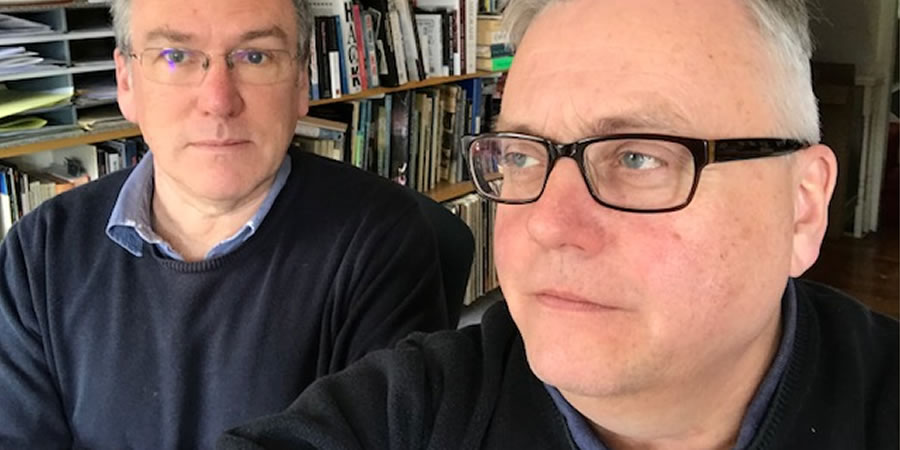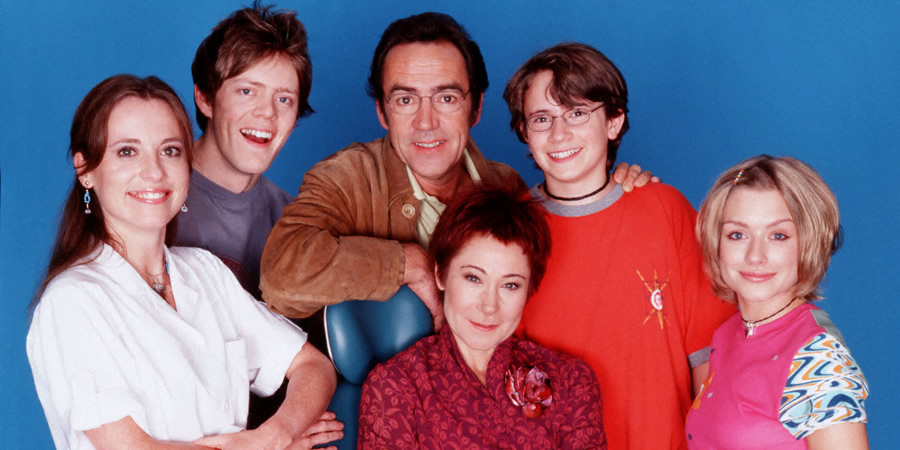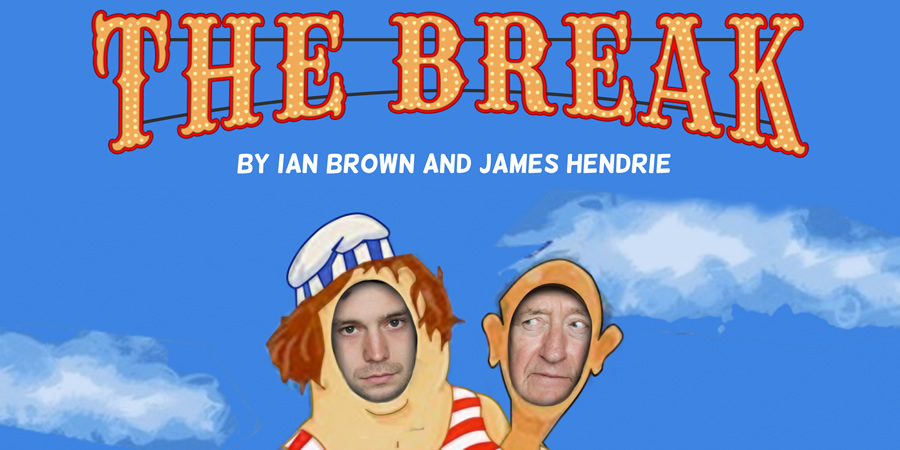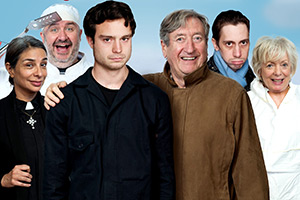Ian Brown & James Hendrie interview

We chat to top sitcom writers Ian Brown and James Hendrie about their comedy careers, and their return to the fictional Yorkshire coastal town of Flamford for a second series of Radio 4's The Break.
Hi Ian and James. Let's start at the start: How did you first get into writing comedy?
James: I started as many do, writing and performing sketches at school. While at university I met now well-known comedian Nick Revell at a party, who very kindly, as I was a complete stranger, suggested I sent some stuff to Radio 4's Week Ending and The News Huddlines on Radio 2, which I did.
Ian: I hit the jackpot with my very first submission: a toilet joke broadcast on Not The Nine O'Clock News. When a cheque for £15 arrived, I realised there was serious money to be made in this business. The NTNOCN people suggested I try Week Ending next, where the money was semi-serious, but you get a cup of tea.
James: And that's where I met Ian. Week Ending was a great show for new writers as it was on 44 weeks of the year, so you could more or less earn a living. Ish.
Ian: We found we had a similar comic 'take' on the stories of the week, so producers started to thrust us together.
James: To write sketches, he means. This seemed to work, so in no time at all...
Ian: ... four years ...
James: ... we were commissioned to write Tales From The Mausoleum Club, a series of Victorian parody mysteries. Followed by our own radio sketch show, Dial M For Pizza.
Ian: We had two series of each, which we fitted around writing for the likes of Jasper Carrott, Tracey Ullman, Lenny Henry, Jonathan Ross, Spitting Image, Rory Bremner, Russ Abbot... Since then we've written together on and off... mostly 'on'.
Your CVs are long... what are your own personal career highlights to date?
Ian: It has to be Spike Milligan coming up to me during the making of Tales From The Mausoleum Club, and asking how we wanted him to play the scene. Everything's been downhill after that.
James: A highlight of mine is writing and directing a short film called Work Experience starring Lenny Henry, which won an Oscar.
Ian: There's also the afternoon we spent in Laurence Olivier's office in The Old Vic, writing panto jokes with Sir Ian McKellen, half-dressed as Widow Twankey, complete with fake Twankey boobs and sporting his 'Fellowship of the Rings' Elvish tattoo.

You worked on both My Family and After You've Gone, two prime-time sitcoms. Despite getting millions of viewers, they didn't always get the nicest of press...
Ian: Some of the press was actually fairly positive, mostly in the tabloids, which know their audience better. I think there's a problem for the broadsheet critics, who are afraid of jokes that actually provoke laughter.
James: When My Family was at its peak, some of the critics were so baffled by its success that it might have been better if they didn't review it at all. It's not their job to be baffled - it's their job to elucidate.
In your time acting as showrunners on those two programmes, what were the biggest lessons you learnt?
James: Choose your battles. Something Fred Barron, the creator of both those shows, taught us was that there's a perfect show in your head. If you get 80% there, you're doing well.
Ian: We also learned that, if you're running the show, you can't write so much. When Fred was in charge, we were writing six episodes per series, which isn't possible when you're wrangling production, actors, and upcoming scripts.
James: The showrunner's task is to keep sight of the creator's original vision. It's a balancing act, allowing all the writers their head while keeping the show on track.
Ian: 'Room Writing' is not writing by committee. You can have a wide-ranging discussion, but in the end someone has to say yes or no.
You've also worked a lot on the radio. Do you prefer scripting for TV or radio?
James: They both have their pluses. In radio, you can build a world and suggest rather than show. On TV, you can do sight gags and there's nothing like a perfectly executed visual joke.
Ian: There's less to get in the way in radio. There's just you, the director and the cast - no lighting, no costumes, no props, so the focus and energy are more squarely on the comedy. The budgets are also much smaller and there's a perceived lack of glamour, so executives are much less likely to come visiting.

Talking of radio, The Break is back for Series 2. For those that haven't heard the show before, could we ask you to sum up what it's about?
James: It's about a young Londoner, Andy, who's been advised for the sake of his health, both mental and physical, to go and stay with his Uncle Jeff in the fictional Yorkshire resort of Flamford. Because they're as different as avocado and mushy peas, when they get together sparks fly... actually, quite unlike avocado and mushy peas.
Ian: It's a sort of comedy of opposites: two people linked by family but quite disparate, wandering around a seaside town meeting eccentric locals and getting into scrapes.
You must be really pleased with the cast that's re-assembled to record the episodes?
James: We're delighted. Actors of the calibre of Philip Jackson, Alison Steadman, Mark Benton, Tom Palmer, Shobna Gulati, and Rasmus Hardiker don't come along every day. Because they're all in such demand, Gordon Kennedy, our esteemed producer/director, had to do quite a bit of juggling to get them in the same room at the same time.
Ian: It's a dream cast. What was nice was, they were all so keen to be in it that holidays were postponed, flights to Sri Lanka were rearranged, and the Sabbath disrespected.
Flamford, the costal town it's set in, has a lovely meandering pace of life. In your own lives, are you guilty of trying to always be busy, or are you managing to take things easy like Uncle Jeff and some of the other residents?
James: We're as busy as the Whack-A-Mole moles in San Diego Slots on the seafront. Flamford may seem to have a meandering way of life but it's like a swan: calm and serene on the surface, but underneath... webbed feet.
Ian: Despite our frenetic working life, we're strangely attracted to indolent characters. In fact, we've written an as-yet-unproduced script about the laziest man in the world and his strenuous and convoluted efforts to avoid work. I feel tired just telling you about it.
Do you think Andy could start living with Geoff long-term... i.e. might you be up for writing a third series?
Ian: We've put in a bid for a third series, but it's in the lap of the BBC gods.
James: We're already at the planning stage. The more we think about Flamford, the more story ideas emerge. No spoilers or anything, but in Series 3 Andy and Jeff may well be taking a trip in a boat.
What are you up to next... a saunter down to the chip shop, or straight on to the next project?
James: We recorded Series 2 in September, so we've been busy with other projects for the last six months. We have a couple of TV sitcoms in development, both single camera and with a studio audience.
Ian: We're also developing some light dramas of the sort we think are missing from our screens. A lot of contemporary drama is a bit glum and humourless, and we think it's possible to combine thrills, intrigue, murder and a jolly good chuckle.
James: After last time, we'll be giving Frank's Fish and Chips a miss. Instead we'll be having a go on Flamford's new and untested Triassic Park Diplodocus Log Flume.

